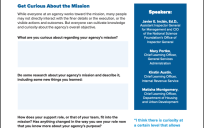Contrary to popular belief, the federal government is not a monolithic mass. Rather, federal organizations differ from one another almost as much as do private organizations—each distinguished by its own culture, work environment, budgetary and IT resources and varied factors that influence how quickly employees ascend the career ladder. Even agencies and offices within the same federal department may significantly differ from one another.
Because of such variations, the advantages of a new job or temporary detail assignment may be partially offset by some disadvantages. To help you analyze such potential trade-offs, here are some factors that will define your experience at any organization.
- The organization’s mission and history, which help shape its challenges and culture. For example, the organizational cultures and challenges of regulatory organizations, science-based organizations and intelligence organizations differ substantially from one another.
- The organization’s diversity and demographics.
- The degree of hierarchy, bureaucracy and formality built into the organization’s structure and culture. Such factors may determine how much red tape is involved in even standard operations, such as hiring; whether the organization applies the latest techniques for doing business; its teleworking policies; employee morale and its methods for addressing systemic management problems.
- The organization’s size. (Smaller organizations may be relatively nimble.)
- The size and stability of the organization’s budget, which probably impact salaries, bonuses, promotion potential, the possibility of RIFs, and the availability of administrative support, the quality of needed training and equipment, including IT resources.
- Office design, which may range from sleek, contemporary and spacious to aging and cramped.
Research your potential employers by networking via personal contacts, LinkedIn and govloop.com, and reviewing its media coverage, and relevant Congressional hearings, including appropriations hearings. Also, review your target organization’s website and social media platforms. Remember: a progressive organization will probably maintain a sleek website and social media platforms; a stodgy website and social media platforms may be a red flag for a stodgy organization.
Also, check out your target organization’s employee satisfaction scores on bestplacestowork.org. But be aware that your opinion of any particular organization would depend on its own vagaries as well as on your interests, personal preferences and personality. Therefore, you may find career-boosting opportunities, a top-notch boss and team-friendly colleagues in an agency that has poor employee satisfaction scores. Alternatively, you may be dissatisfied in an agency that has high employee satisfaction scores.
Use job interviews to learn about the particulars of your target job. The personalities of interviewers, the information they provide, the questions they ask, and your treatment during the selection process may reflect the organization’s management and culture. Also, tactfully ask about organizational culture during interviews.
By Lily Whiteman, author of How to Land a Top-Paying Federal Job





There’s plenty of great advice that I wish I’d have had in my intern days here! Good job at highlighting some of the intangibles that can make or break a certain employment opportunity.